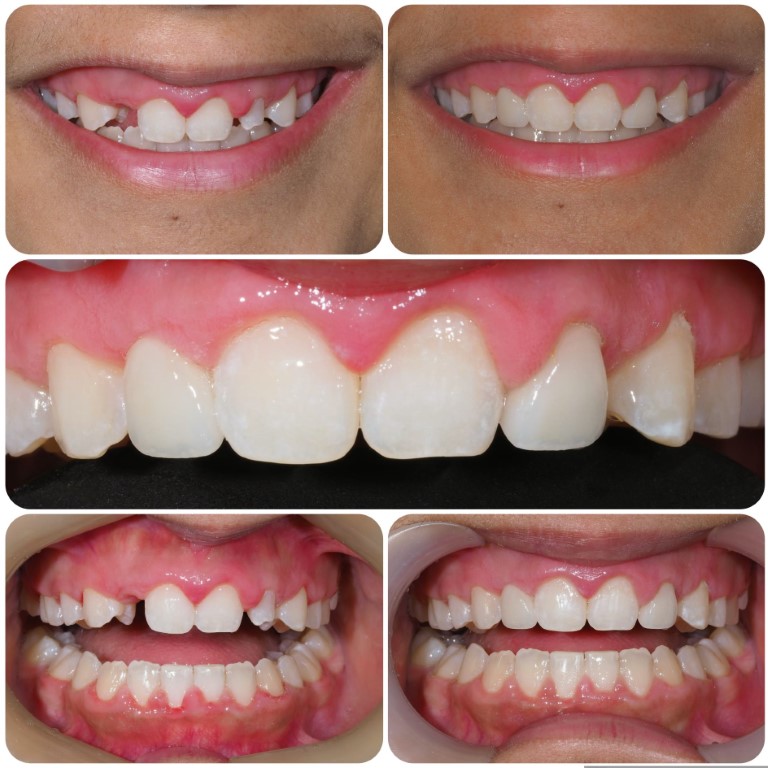
What Causes a Root Canal Infection?
A root canal infection typically arises when bacteria penetrate the pulp of a tooth, which contains nerves and blood vessels. This can happen due to:
- Deep tooth decay: cavities that reach the pulp provide a direct pathway for bacteria.
- Cracked or damaged teeth: Chips or fractures can expose the inner tooth to infection.
- Failed root canal treatment: Incomplete cleaning or sealing during an earlier procedure may leave room for bacteria to grow.
- Gum disease: Advanced periodontal infections can spread to the roots of nearby teeth.
Understanding these causes can help prevent infections or identify the issue early.
Root Canal Infection Symptoms
Recognising the signs a root canal is infected can help you seek treatment before the problem worsens. Common symptoms of infection in a root canal include:
- Persistent pain: A throbbing ache in the affected tooth or surrounding area.
- Swelling: Inflammation or tenderness in the gums near the infected tooth.
- Discolouration: The tooth may appear darker than the surrounding teeth.
- Sensitivity: Increased sensitivity to hot or cold foods and drinks.
- Foul taste or smell: A bad taste or odour may indicate a build-up of bacteria.
- Pus formation: Visible abscesses near the tooth are a clear sign of infection.
If you notice any of these symptoms, it’s important to call Cranbourne North Dental immediately.


Root Canal Infection Treatments
Treating an infected root canal tooth typically involves addressing the infection while preserving the tooth structure. Options include:
- Root Canal Treatment: This procedure removes infected or damaged tissue from inside the tooth, relieving pain and saving the natural tooth by cleaning, disinfecting, and sealing it to prevent further infection.
- Root canal re-treatment: If the tooth has already had a root canal in the past, we may need to reopen the tooth, thoroughly clean the canals, and reseal them to prevent further infection.
- Antibiotics: Prescribed in some cases to control bacterial spread before, during or after treatment.
- Drainage of abscess: In severe cases, abscesses are drained to relieve pressure and promote healing.
- Tooth extraction: When the infection is too advanced to save the tooth, removal may be necessary, followed by a dental implant or bridge.
- Gum disease management: Occasionally, the root canal system can also be infected with gum disease bacteria due to periodontitis (LINK) and poor oral hygiene. These are double infections that need boot root canal treatment and gum disease treatment.
Your dentist will assess the severity of the infection and recommend the most effective treatment for your situation.
Prevention and Maintenance
Preventing a root canal infection starts with maintaining excellent oral hygiene and attending regular dental check-ups. Follow these tips to protect your teeth:
- Visit the dentist regularly: Regular check-ups help catch small issues, like tiny holes, early and prevent bigger, costly problems.
- Brush and floss daily: Clean your teeth thoroughly to remove plaque and prevent decay.
- Address cavities early: Treat minor tooth decay promptly to avoid deeper issues.
- Protect your teeth: Use a mouthguard during sports and avoid chewing hard objects that could cause cracks.
- Follow aftercare instructions: After a root canal treatment, adhere to your dentist’s guidelines to avoid reinfection.
- Dental crowns: If you’ve had a root canal, it is generally recommended to place a dental crown (cap) on the tooth to ensure long-term strength and protection.
Call Cranbourne North Dental For Your Root Canal Infection Now
A root canal infection can cause significant discomfort and can impact your oral health if left untreated. Fortunately, modern dental treatments offer effective solutions to eliminate the infection and restore the tooth. If you suspect an infection or experience any symptoms, contact Cranbourne North Dental today to schedule an appointment and protect your smile.
Our Treatments
Frequently Asked Questions

What are the most common signs of a root canal infection?
Persistent pain, swelling, tooth discolouration, sensitivity, and pus formation are common signs a root canal is infected.
Can an infected root canal heal on its own?
No, professional treatment is necessary to remove the infection and prevent further complications.
How painful is root canal treatment for an infection?
With modern anaesthesia and techniques, root canal treatment is typically no more uncomfortable than a standard filling.
How long does it take to treat an infected root canal tooth?
Treatment duration depends on the severity of the infection but usually requires one to two appointments.
Can a root canal infection spread to other parts of the body?
Yes, untreated infections can spread to the jaw, face, or even bloodstream, making prompt treatment essential.




















